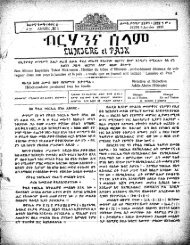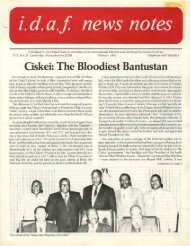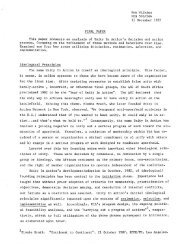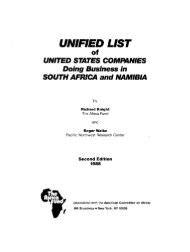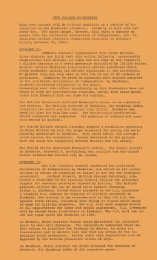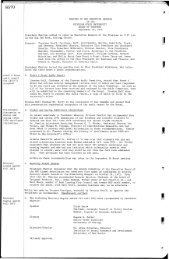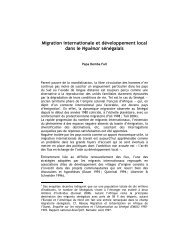the churches and southern africa - KORA
the churches and southern africa - KORA
the churches and southern africa - KORA
Create successful ePaper yourself
Turn your PDF publications into a flip-book with our unique Google optimized e-Paper software.
in <strong>the</strong> countries which have adopted <strong>the</strong> urban guerrilla, it<br />
is necessary to note that <strong>the</strong> struggle in <strong>the</strong> countryside is<br />
not very developed. The actions in <strong>the</strong> cities are relatively<br />
detached from <strong>the</strong> peasantry which remains separated<br />
from <strong>the</strong> movement. The combining of <strong>the</strong>se two forms<br />
of struggle in light of <strong>the</strong> appropriate conditions in each<br />
country will permit a successful revolution.<br />
QUESTION: The struggle has two fronts: to <strong>the</strong><br />
struggle against Portuguese colonialism you add <strong>the</strong><br />
struggle against traditionalist obscurantism, <strong>and</strong> religious<br />
fetishism <strong>and</strong> magic. Are you thinking of helping create<br />
<strong>the</strong> "new man" envisioned by <strong>the</strong> Cuban revolution?<br />
ANSWER: We think that <strong>the</strong> revolution will create<br />
that "new man." Our objective is, for one part, <strong>the</strong><br />
destruction of <strong>the</strong> colonial structure, for <strong>the</strong> o<strong>the</strong>r part<br />
<strong>the</strong> construction of our nation. For <strong>the</strong> second we have<br />
need of men, for <strong>the</strong>se are <strong>the</strong> ones who make up a nation<br />
<strong>and</strong> can guarantee a certain form of social organization.<br />
The program of our movement has a teaching stage aimed<br />
at changing <strong>the</strong> mentality of our people .<br />
But when you talk of aspects of culture engrained in<br />
our people for centuries, <strong>the</strong>y cannot be erased in a day<br />
by ano<strong>the</strong>r .... Certain popular practices are good, o<strong>the</strong>rs<br />
not. We wish to conserve or revive those aspects of<br />
Angolan culture that centuries of colonization have<br />
misdirected or destroyed. Music, dance, <strong>and</strong> art ... were<br />
stifled by colonialism which sought to impose its own<br />
cultural forms.<br />
There also exist practices that are not positive .... The<br />
movement combats fetishism through education .... The<br />
formation of <strong>the</strong> "new man" is <strong>the</strong> greatest task <strong>and</strong> <strong>the</strong><br />
most difficult for us.<br />
Agostinho Nato<br />
QUESTION: How will this new man integrate himself<br />
into <strong>the</strong> infrastructure set up by colonialism?<br />
ANSWER: A militant who has assimilated <strong>the</strong> ideology<br />
of <strong>the</strong> movement would not be able to adapt to <strong>the</strong> actual<br />
conditions gf life in <strong>the</strong> zones controlled by our enemy. A<br />
radical change in <strong>the</strong> structures of material life will be<br />
necessary. A new economic structure will determine a<br />
new way of thinking. The exploitation of man by man<br />
cannot serve as <strong>the</strong> base for creating a "new man."<br />
MPLA AND GRAE MOVE TOWARD UNITY<br />
In early June, at <strong>the</strong> OAU summit conference in<br />
Rabat, Holden Roberto of <strong>the</strong> National Front for <strong>the</strong><br />
Liberation of Angola (FNLA) <strong>and</strong> Angolan Revolutionary<br />
Government in Exile (GRAE), <strong>and</strong> Agostinho Neto of <strong>the</strong><br />
Popular Movement for <strong>the</strong> Liberation of Angola (MPLA)<br />
both addressed <strong>the</strong> assembly promising to move toward<br />
reconciliation of <strong>the</strong>ir movements. The OAU has set u a<br />
commission to settle <strong>the</strong> details of <strong>the</strong> unification.<br />
Presidents Ngouabi of <strong>the</strong> Congo, Sese Seko of Zaire,<br />
Kaunda of Zambia, <strong>and</strong> Nyerere of Tanzania will be<br />
co-mediators. The Rabat reconciliation was preceded by<br />
intense meetings in Brazzaville between <strong>the</strong> movements<br />
<strong>and</strong> <strong>the</strong> Presidents of Congo <strong>and</strong> Zaire. (Daily News,<br />
Tanzania, June 10, 1972; Afrique-Asie, 10 Juillet, 1972;<br />
lhe Washington Post, June 16, 1972; joint communique<br />
MPLA/GRAE; Radio Brazzaville, May 31 <strong>and</strong> June 10,<br />
1972)<br />
LIBERATION MOVEMENT MILITARY ACTIVITY<br />
MPLA communiques report increased Portuguese<br />
activities in March <strong>and</strong> April along <strong>the</strong> Zambia/Angola<br />
border at <strong>the</strong>l time <strong>the</strong> Portuguese wanted to prevent a<br />
suspected visit to liberated Angola by <strong>the</strong> delegation from<br />
<strong>the</strong> U.N. Decolonization Committee. During that time<br />
,<strong>the</strong> Portuguese lost at least 82 soldiers, 9 troop carriers,<br />
a bridge, <strong>and</strong> a barrack. (Zambia Daily Mail, May 9, 1972;<br />
Times of Zambia, June 28, 1972)<br />
On May 22, MPLA units attacked <strong>the</strong> Portuguese army<br />
barracks in Cabinda. Both <strong>the</strong> barracks <strong>and</strong> <strong>the</strong><br />
reinforcements sent by <strong>the</strong> Portuguese suffered heavy<br />
losses. (Radio Free Portugal, June 30, 1972) UNITA<br />
communiques also indicate attacks on Portuguese troops<br />
on Feb. 11 <strong>and</strong> 15, March 28, <strong>and</strong> April 10, 1972, usually<br />
in response to an attack several days earlier by Portuguese<br />
forces, those in April being reported to be Katangese<br />
gendarmes at service of <strong>the</strong> Portuguese. UNITA reports<br />
kiIling 40 in <strong>the</strong>se encounters <strong>and</strong> capturing a variety of<br />
weapons <strong>and</strong> o<strong>the</strong>r material. Both UNITA <strong>and</strong> MPLA<br />
report heavy bombing raids by <strong>the</strong> Portuguese <strong>and</strong> use of<br />
defoliants <strong>and</strong> herbicides during this period.<br />
ANGOLA: PORTUGUESE DEFENSE<br />
The Zambia Daily Mail of May 19, 1972 reports <strong>the</strong><br />
presence of South African troops based near Luso in<br />
nor<strong>the</strong>astern Angola to help Portuguese forces. The<br />
Sunday News of Tanzania dated May 28, 1972 reports<br />
that two Angolan deserters from <strong>the</strong> Portuguese, forces<br />
told a Canadian journalist of American Green Berets<br />
advising <strong>the</strong> Portuguese. Angolan peasants <strong>and</strong> MPLA<br />
guerrillas confirmed Green Beret presence <strong>and</strong> estimated<br />
<strong>the</strong>re might be 40 of <strong>the</strong>m in Angola. The U.S.<br />
Ambassador to Zambia denied <strong>the</strong> presence of Green<br />
Berets in Angola.<br />
On June 7, 1972 <strong>the</strong> Portuguese High Comm<strong>and</strong> in<br />
Angola announced <strong>the</strong> loss of a military helicopter with<br />
its crew of two. A June 6 Congo (Brazzaville) had<br />
announced shooting down a Portuguese army helicopter<br />
<strong>and</strong> crew. (Agence France Presse, June 6, 1972? Daily<br />
Telegraph, U.K., June 8, 1972)<br />
BENGUELA RAILWAYS AND GENERAL ELECTRIC<br />
Hoyt P. Steele, a vice president of General Electric,<br />
responded in a letter of June 16, 1972 to an inquiry from<br />
<strong>the</strong> American Committee on Africa about a G.E. contract<br />
with <strong>the</strong> Benguela Railways for 10 locomotives, <strong>and</strong><br />
about loans arranged to finance 90% of <strong>the</strong> agreement.


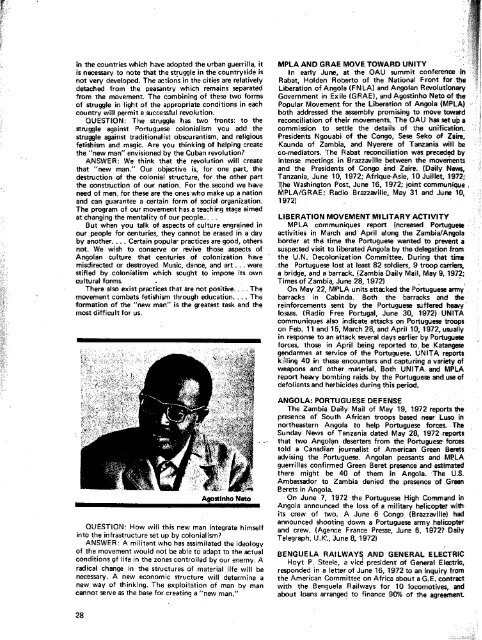
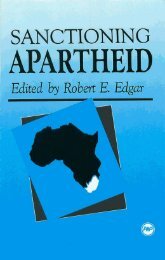
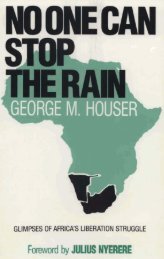

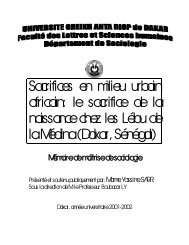
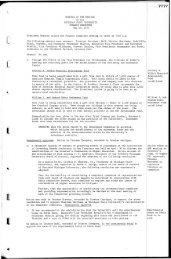
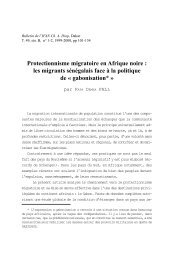
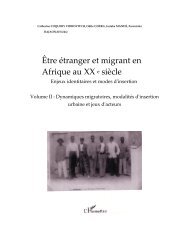
![Synthèse [6] DEFALL..INSTRAW.pdf - Matrix](https://img.yumpu.com/17880734/1/190x245/synthese-6-defallinstrawpdf-matrix.jpg?quality=85)
